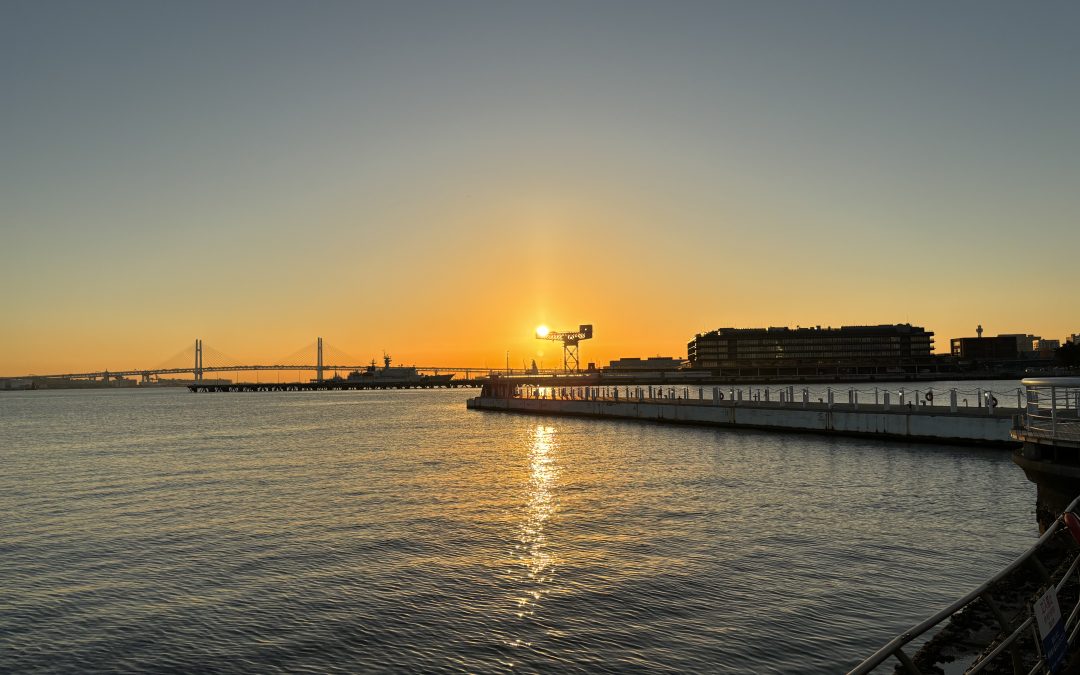Workmen gather at the start of their shift in matching blue hard hats. Reminds me of the nursery kids from yesterday in their matching yellow caps. Forming a circle around their foreman, the engineers receive instruction before taking a group bow, now ready to begin…
Minatomirai is an active area for construction, buildings appear to fly up and engineers dart in and out. There was once a derelict patch of land at the side of Taiga’s park, it soon became a Nissan car showroom, weathered a brief stint it was a circus (Taiga and I loved the motorbikes and I played him the ‘Wall of Death’ Richard Thompson song) and now it’s the K-Arena pop stadium.
Here is Minatomirai the landscape changes annually, more concrete, more glass, more guests. This morning the landmark tower was on Japanese national TV, a common sight, frequently used as a backdrop for presenters and movies. Incidentally, those with an curiosity about contemporary Japanese culture may find the film Aristocrats HERE interesting, and it’s filmed here in Minatomirai
It’s 2:11pm as I write this and the blinds are down in the cafe, to protect customers screens and eyes from the bright afternoon sun. I’m disappointed that my view of the high street is restricted but through the gap between the blinds I catch glimpse of a man brushing litter into a footlong dustpan. If I had to guess I’d suggest he is 78 years old, moving his body with due consideration and care. Many people work through their retirement, not for the money but for a sense of purpose, a healthy body and mind. There’s an organization called ‘Silver Jinzai’ that finds roles for thier 700,000 registered pensioners who claim the most important things are keeping themselves busy and giving back to society. There is no retirement age for Doctors in Japan. The word “sensei” is used for both teachers and doctors, a true sensei is one dedicated to serving others for the betterment of their health and education.
Sunday was spent pitchside, watching Taiga play for Liverpool FC Academy, a match against Karasu Mori (black bird forest) at their home training facility in Kawasaki. He was on the pitch for 4 hours in total, from 12:30 to 16:30, I sipped ice cold water from the vending machine and tried to hold back my cheers when he scored an absolute stunner from outside the box. I’ve been warned by Taiga himself the applause is more muted here than in the UK. He’s really taken to football and advanced rapidly under the rigorous training of Liverpool since joining their competitive program in April this year. He is 9 years old but last weekend saw him line up for the U12s for the first time. I couldn’t help but feel an immense rush of pride as the coach called out his name and presented him with his ready to wear ironed shirt with his no. 11 and his name on the back. I’m also keen to learn more about the clubs trips to England, one of Taiga’s team mates TC told me that he went to a ten day summer camp at Anfield this August, and had a great time despite being confused and mildly disturbed by the bathroom/toilet situation within the accommodation. In Japan you won’t find a toilet inside the same room as a shower or bath, and they don’t enter the bath until they’ve had a shower – think Roman baths.
I didn’t realise how much I have my hands in my pockets, but a couple of trips to Taiga’s school in recent days have highlighted this. Saturday was an open day, today was a musical performance, and everytime you visit the school you’re required to bring your ID card, and a spare pair of clean ‘indoor shoes’ (or slippers) in a plastic bag. When you arrive you change shoes, and carry your outside shoes in a bag around with you. I’ve noticed that upon greeting others, whether that be teachers, the headteacher, or fellow parents a 45 degree bow is custom and expected, but also accompanied by hands placed on front thighs, a smile and a gaze that should last as long as the receiver wishes it to to be (can be tricky to decipher). Hands in pockets seems to dilute the bow somewhat. I guess I was thinking that if I show others I’m relaxed, then I’m not a ‘threat’ and it’s an invitation for them to relax too, but it doesn’t work like that. Body language appears to be read transparently, and as such your day runs smoother when you’re explicit with your respect for the other.
I was impressed with just how many parents turned up for this musical performance, especially given it started 08:30am sharp. The music teacher sat at the grand piano on stage with her choir of children, recorders swinging on shoelaces from their necks. The rest of the pupils sat on the hall floor, invited parents stood at the rear of the hall (seating wasn’t offered) and phone in hand, watched in silence as their children performed. Taiga was stood next to H up there on the stage and did well, playing recorder and singing a song in the choir. I zoomed in on him as I filmed and it was great to see his new bromance with H blossoming, as they exchanged nervous glances and whispered comments to one in between songs. The collective sound of the recorders playing in unison, accompanied by the grand piano resonated well around the high sports hall ceiling and hard wooden floors. The seated pupils reciprocated with a song sung back to the performers, and at the end parents were invited to offer ‘feedback’ to the children, celebrating their show and offering encouraging words for the future. I had no idea what was said, but it felt great to be included in this circle.
After school I accompanied Taiga to his swimming class. It feels worth noting that parents are permitted poolside, and photographs are allowed. I didn’t take any and won’t be sharing anything here but it feels relevant in sharing an accurate picture of how things are. As we walked back with his friend from swimming, the two lads must have been hungry as his mate (Ai) said: “What will you have for dinner? Does your Dad cook for you?” which triggered a conversation about their favorite meals “Yakitori, Yakiniku, Curry, Sukiyaki, Soboro, Donbori” were just a few of the names of dishes banded about in this animated discussion. Japanese are passionate about food, and this permeates everywhere. In addition to cooking shows, food seems to pop up across all TV genres – be that news, kids, drama, quiz shows, and more. I remember the first time I saw a group of teenage lads out together, seated in a restaurant and ordering course after course of small tasting plates. There was about 6 of them, and they were all about 17/18 years of age – sampling dishes and discussing the flavours in a way i’d only seen middle aged middle class people do.
The meals Taiga and his mate are discussing are all fairly complex dishes, rich in flavour, comprising fresh ingredients and crucially vitamins and nourishment. It can’t be a co-incidence that Japan is stated as one of the places people live the longest on this earth. Their longevity can also be attributed to strong social ties, as well as a deep sense of purpose that I referred to earlier with retired people finding roles in the working environment.
Talking of which, I continue to embed myself with my new band – the sun worshippers. 6:10am this morning I was down at Tokyo Bay singing with them again, and today they asked for my age and occupation. Their curiousity in me is understandable and feels genuine – I think I’m at least 20 years younger than their youngest member. Our choir leader switched today, we had a lady conducting us who used an app on her phone to lead the choir in singing the Insen scale, as opposed to the battery powered synth the other guy uses. It’s been 3 times now I’ve caught them in time, as the sun rises and we’ve welcome the day in together. It feels great to say “Good morning. How are you?” and have that slight but steady connection with fellow residents of this little town out here in Tokyo bay. Go talk to your neighbour, the cashier in the shop, the bus driver. Humans can’t sustain themselves on DMs alone!

